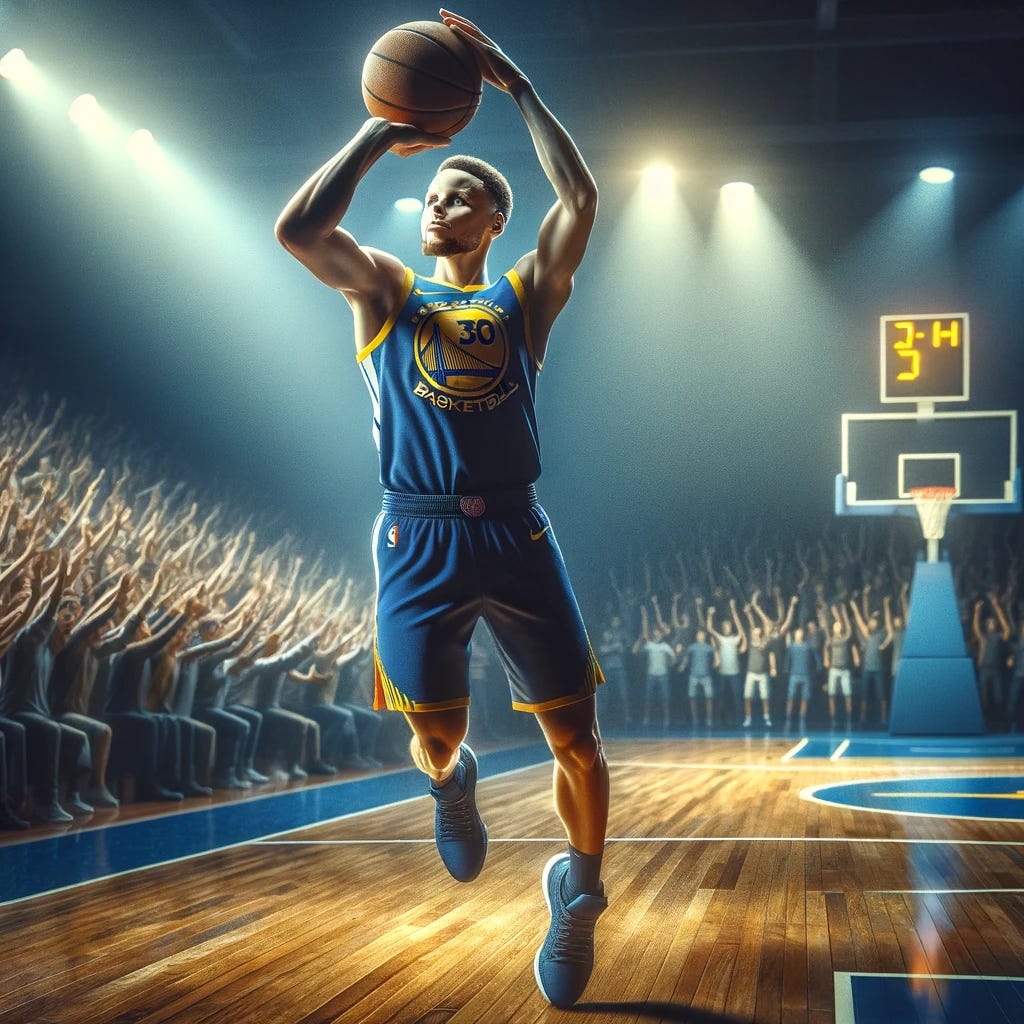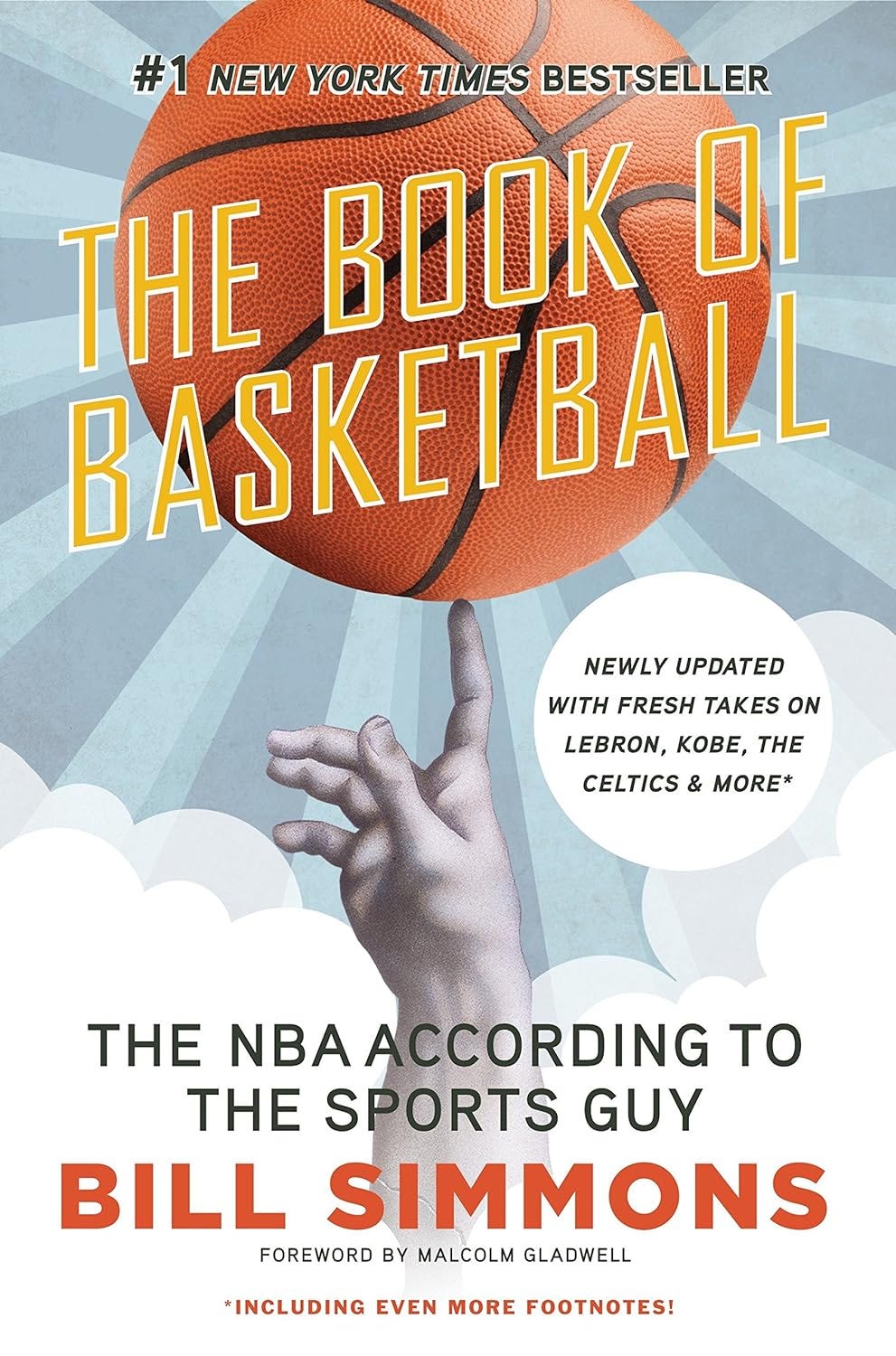Steph Curry's -- Repeated Leaps
The Game Changer Who Leapt Beyond Traditions
Dear Basketball Aficionados,
The Book of Basketball by Bill Simmons ranks Steph Curry at #24.
However, few players like Wardell Stephen Curry II have revolutionized the game. His journey from a high school prospect to an NBA legend is punctuated with daring leaps of faith that redefine success with each shot he takes.
Curry and his Golden State Warriors take on the Dallas Mavericks tonight on ESPN.
The Fundamental FollowThrough: Seemingly every athlete, every coach, in every sport, has a mantra —> “Follow Through. “ Yet it’s the thing Curry doesn’t always do. Conventional wisdom holds that an inconsistent follow-through will torpedo your shooting percentages; however, Curry takes the risk knowing that he doesn’t need his wrist. Sometimes yes, sometimes no, but always within the flow.
Even Curry's shooting form—often not following through, turning away as the ball arcs toward the hoop—symbolizes his confidence. Each shot is a testament to years of practice, a leap of faith that has consistently connected with the net, so much so that he sometimes turns and moves back on defense, knowing the outcome even before the ball swishes through the net.
Curry's influence trickles down to every level of the game. High school players now emulate his deep shooting; college programs recruit with a preference for range; and in the pros, the three-pointer is no longer a surprise element but a staple. His splashdowns are legendary. Coaches struggle with the reality that it’s a player’s game at every level now, and their suggestion to “follow through” is no longer required for greatness—look no further than Curry as the greatest of all time for proof positive.
Check out this video of his first 2500 threes, and know that he continues to build on his NBA all-time leadership position with over 3400 threes at the start of the 2023 season.
However, it’s not each of the threes that made the difference. Sure, it did in a game, in an instance, at the moment.
Curry, as much or more than anyone else since Wilt Chamberlain, changed how the game was played. Five rules were changed because of Chamberlain; the NBA outlawed offensive goaltending, defensive goaltending, and the rules on free throw shooting. Wilt could dunk, if not drop, the ball in the basket on free throws via a running leap before his feet landed on the ground. All impressive acknowledgments, but each item was outlawed for its exceptionalism at or above the rim.
Conversely, the entire League changed how they played the game as Curry’s excellence spread the floor and opened up possibilities for shooters. Moreover, fans loved the high-scoring action.
You’ll see more teams shooting more three-pointers today. His success and the quantitative aspect of trading two-point baskets for three-point baskets turns into a winning strategy. A good percentage from outside the 3-point mark would be 33.3%, which yields 1 point per possession. The equivalent for a 2-point shooter would be for them to hit on 50.0% of his shots. Curry, in his career, hits on 42.8% of his 3s.
Enough of where we are, though. How did Curry make it to these unprecedented levels?
Steph’s dad, Dell, played in the NBA, notably for the Charlotte Hornets, where Curry attended high school at Charlotte Christian. His mom, Sonya, played volleyball for Virginia Tech. During high school, Steph was ranked as the 300th-best player in the 2006 graduating class.
Impressive, but NOT otherworldly. While he may have longed for a spot as a North Carolina Tar Heel or a Duke Blue Devil, he made a leap of faith.
The Davidson Wildcat Leap: Curry's choice of Davidson College, a modest mid-major program for his collegiate career, was his first significant jump. At Davidson, he showcased the spirit of a giant killer, leading the Wildcats on an epic NCAA tournament run that etched his name in the hearts and minds of fans nationwide. He got hot, and the Wildcats beat Gonzaga, Georgetown, and Wisconsin before losing to Kansas by 2 in the Elite Eight.
The Draft: The undersized guard was picked 7th in the draft by the Golden State Warriors. Recognized as the best shooter in the draft, Jay Bilas acknowledged that Curry’s deep range “went beyond NBA range.”
Some wondered if his lack of physical presence —size or power— would adversely impact him. As it turns out, range matters, and he wasn’t to take or make shots that others wouldn’t have risked taking.
When Steph Curry won his MVP award in 2015, he did not just accumulate personal accolades; he signaled a shift in the perception of what an MVP could be. They were no longer solely dominant physical forces but also maestros of precision and skill from beyond the arc. He was the ESPY Award winner for Male Athlete of the Year and the AP Male Athlete of the Year. During a season in which his team won 73 games, still a single-season record, he also set the single-season record for most NBA three-pointers in a season.
But for all the accolades, he didn’t take home the trophy.
In what would have been the perfect cap to the season, and up 3-1 to the Cleveland Cavaliers, the Warriors lost 3 in a row and fell to LeBron James, Kyrie Irving and Kevin Love in 7 Games.
Where would the team go from there?
Ironically, the Oklahoma City Thunder held a 3-1 lead over Curry’s Warriors in the Western Conference Finals. Not only did Curry know about making the comeback, but he could also relate to losing the lead.
The Secret: I mentioned the Book of Basketball by Bill Simmons, a 700-plus-page book known not only for ranking the players but also for revealing the “Secret”- why some, like Curry, win championships and others do not.
While the below could have been stated about Durant, it’s Simmons's summary of his Vegas poolside conversation with Isiah Thomas and his championship years in Detroit. The team made room for Dennis Rodman by trading Adrian Dantley:
“If they didn’t make that deal, they wouldn’t have won the championship. It was a people trade, not a basketball trade… Those teams were loaded with talented players, yes, but that’s not the only reason they won. They won because they liked each other, knew their roles, ignored statistics, and valued winning over everything else. They won because their best players sacrificed to make everyone else happy. As long as everyone remained on the same page… it’s not about basketball.” (Simmons, 40–41)
Two Negatives Make a Positive: It’s as if Curry had read the excerpt (quite possibly, given its 2010 publication) and realized that the Pistons had secured addition through subtraction. He saw an opportunity for amplification by accumulating.
Recruiting the Thunder’s Kevin Durant to the Golden State Warriors during Curry’s prime was a power move, a strategic leap toward constructing a modern-day dynasty. Both teams had held power positions yet come up short.
This decision underscored Curry's understanding that the sum of a team's stars could eclipse the brilliance of individual talent. In the current version of the NBA—why not take this version of a Super Team to an all-new level? The Warriors had won 73 games the year before—and would effectively now have two of the NBA’s top three players.
Curry, at the top of his game, wanted to add a teammate at the top of theirs. Not surprisingly, the Warriors won the following two NBA titles.
Leaping Forward: As we continue to chronicle Curry's career, it's clear that his influence on basketball is profound and permanent. It's a leap from tradition to a new school of thought, where taking a shot from the half-court line isn't just showing off—it's a viable strategy. He’s changed the game forever more.
What's the takeaway for us? Whether in sports, business, or life, sometimes you have to challenge the status quo and trust in your abilities. Steph Curry's career is a blueprint for innovation and an invitation to leap into the unknown with the confidence of a practiced hand.
As you step into your courts of play, may you find your three-pointer, your game-changer, and may you shoot it with the confidence of Curry turning away, going back to work, knowing it's going in.
To the game-changers,
Jim Flint





Great basketball analysis. Sports often may be reflected in life’s endeavors. And I love Stephen Curry. He knows how to be confident and vulnerable. Stephen is the epitome of a gifted athlete with a likable personality.